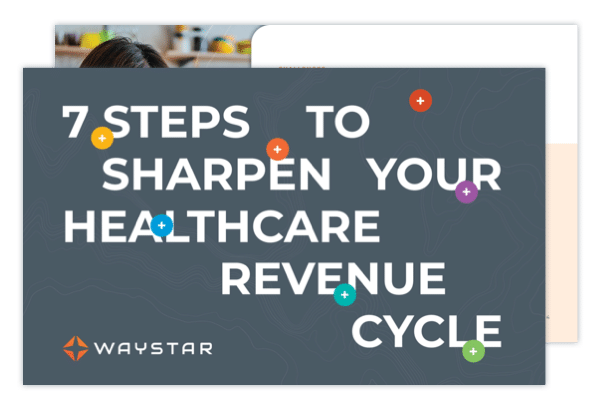This is the fourth post in a new Waystar blog series: 7 steps to sharpen your healthcare revenue cycle.
Can’t wait for a new blog each week? Download the eBook to learn 7 steps for maximizing your healthcare RCM software.
Point-of-service collections in healthcare grow more complex — and more critical — each day.
When patients generate a significant piece of provider revenue, organizations need a solid financial clearance process to set expectations and boost pre-service payments. But successful organizations don’t stop there.
Use these four tips to improve your collections at the time of care.
Point-of-service collections in healthcare tip:
1. Share the costs
Co-payment collections are a necessity. In fact, they’re an obligation, as most commercial payers require participating providers to collect co-payments from patients. Cost-sharing, of course, is a means of controlling utilization. You play your role in that effort by requesting co-payments, as well as any other applicable point-of-service charges.
As payers shift responsibility to covered beneficiaries, collecting co-insurance and unmet deductibles becomes a skill your organization must develop — and quickly.
- To start, know the allowable for the service being rendered, even if you won’t have all the details in advance. For example, identify the level of the evaluation and management code for the office visit or accompanying lab tests.
- Then, identify the specific allowable for the patient’s health plan — often one of the dozens, if not hundreds, of plans with which you have contracts.
An automated price estimator is invaluable in this process. This tool may be available through a payer portal, a payment monitoring system, or as a standalone software product.
Point-of-service collections in healthcare tip:
2. Know the right questions + cues
Success in collections starts with knowing how to ask for money. When a patient checks in for a visit, for example, you can request point-of-service payments in a specific way that invites action.
Rather than asking: “Would you like to pay?”
Replace it with the more effective: “How would you like to take care of your co-payment today?”
Then, once the patient offers their preferred form of payment, you can politely mention any additional balance and request payment.
For example, say: “You have a balance of $100. Can we put that on your card as well?”
Obviously, this part of the process should also include financial assistance where appropriate, but it’s a good place to add a human touch. When you swap a human for a computer, you increase your success rate. And that rate increases even more if collections are embedded into the patient-communication platform.
Point-of-service collections in healthcare tip:
3. Set a minimum deposit
For patients who are not insured, collect a pre-determined minimum deposit.
- Many organizations find the most effective deposit is the average co-payment that would be due by their commercially insured patients.
- For others, a rate close to their total visit charge is appropriate.
- Some practices charge different deposits for new versus established patients.
The key is consistency. Don’t break the protocol you establish unless the patient meets financial hardship criteria.
Point-of-service collections in healthcare tip:
4. Hold a card “on file”
If you have the capabilities, ask permission to securely hold a patients’ credit card “on file” for future transactions. Securely storing that information gives you the flexibility to collect deposits and residual charges rapidly, or initiate effective payment plans.
Want to know more about optimizing your rev cycle?
- Read all the blogs in this series
- Watch the webinar with Dr. Elizabeth Woodcock
- Download the complete eBook



